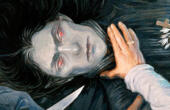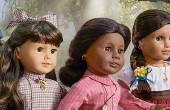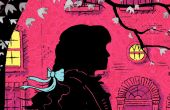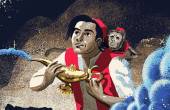Stephanie M.
I'm a content writer and novelist who loves books, writing, theater, and my cat. I have published two novels and traveled to London and Paris.
Columnist III
- Plebian Penman
- Common Writer
- Aristocratic Author
- Noble Scribe
- Lurker
- Pssst
- Hand Raiser
- Vocal
- Outspoken
- Extrovert
- Center of Attention
- Forms a Crowd
- Sharp-Eyed Citizen
- Town Watch
- Detective Deskman
- Penman Patrol
- Forensic Fiend
- Motivational Columnist
- Motherboard
- Composition
- Literary Art
- Referencer
- Actor
- Successful Pilot
- Animator
- Animaniac
- Well Read
- Chaptered Mind
- Art Collector
- Article of the Month
- ?
- Articles
40 - Featured
36 - Comments
694
- Ext. Comments
338 - Processed
191 - Revisions
188
- Topics
81 - Topics Taken
5 - Notes
248
- Topics Proc.
81 - Topics Rev.
19
- Points
13308 - Rank
4 - Score
9138
Latest Articles
Latest Topics
Reality Competitions as Literary PlotsOne of the "hottest" books on Amazon right now is Chain Gang All-Stars, by Nana Kwame Adjel-Brenyah. It's billed as a hard-hitting drama in which American prisoners compete for their freedom on a bloody, Gladiators-style reality show on which "elimination" means actual death. Detractors look askance at the hype and writing style, but despite the book's newness, Adjel-Brenyah already has plenty of fans. Chain Gang All-Stars brings to mind several other novels with this "reality show" conceit, from more lighthearted examples like Chicken Sisters and Take the Lead to Death Warrant and Cinderella is Dead. Whether or not elimination from these fictional reality competitions means one's life is forfeit, books like these usually offer discussion fodder regarding the deceptive nature of reality TV and social media, the meaning of trust and alliances, and other multifaceted topics. Examine some examples of "reality literature" from any genre you like (thriller, rom-com, YA, or any combination). You could, of course, include Chain Gang All-Stars. Compare and contrast your examples, looking at character development, depth of themes, use of tropes, and any other issues you like. Examine what this particular subgenre is trying to say to readers, and how writers might keep its messages fresh in a world that continues in saturation of fast-paced reality shows, online influencers, cancel culture, and more. |
True or Fictional Crime: Which Holds Greater Appeal?True crime documentaries and narratives are intensely popular, particularly on streaming services. Many people, particularly women, report watching this type of documentary for relaxation, much to the amusement of social media (e.g., memes, reels, comedy bits). A plethora of true crime podcasts also exist, and these often get listeners talking "in real time" over radio waves when other subjects may not. However, fictional crime was a popular genre long before true crime, and remains so. Mystery movies, detective television series, and movies centered on the lives, escapes, and even last days of inmates, garner tons of views, reviews, and discussions every day. Some fictional crime stories, such as The Shawshank Redemption or The Great Escape, have taken their place among "classic" films. With true and fictional crime getting so much attention, many questions arise. Namely, which type attracts what sort of audience, and why? Is there any overlap, and where does that exist? Perhaps most importantly, is there any way to tell whether true or fictional crime is more appealing? Analyze this last question in light of the other two, as well as factors such as the nature of the crimes (e.g., "cozy mysteries" vs. "harder" crimes), storytelling choices and mechanics, casting choices, or any other factors you choose. If you choose to gear your argument toward one side or the other, choose some examples to prove why that version is the stronger, more appealing one.
|
Magical Games in FilmThe original Jumanji (1995) remains a nostalgic classic almost 30 years after its release. Its technologically updated sequel might have gotten the side-eye from the original film's devotees, but also pulled in a flock of new fans, as evidenced when a third movie invited viewers back to its jungle. Zathura, which featured a space-themed board game, is arguably less beloved than the Jumanji films but has plenty of fans. And the new film Family Pack has thrown players of yet another magical game into 1497 France to face werewolves while grappling with their personal problems, deep emotions, and general dysfunction. Analyze the presence and appeal of magical board games in family films. What makes magical board games the right catalysts to bring families, siblings, or even strangers (thus, "found family") together in these films, as opposed to say, video games or a game on the sports field or court? Do these films have something special to say to families in today's technology-driven age and if yes, what is it? Do "magical board game" stories have potential as a bigger subgenre, and if yes, what other board game themes, family structures, or themes of the human condition could be explored? Use the mentioned films as a jumping off point, but feel free to explore what as-yet-untapped plots might look like.
|
Locked | Can Creators Redeem the Horror Genre's Inherent Ableism?Whether or not it's "spooky season," the horror genre has hordes of devotees, and well it should. Horror gives us a safe outlet for facing our fears, exploring our inner demons, and pitting our inner heroes against some of the most frightening scenarios ever conceived in creators' minds. Whether in books, in film, on the stage, or in some other medium, horror has earned its place as a revered genre. However, the 21st century has exposed a particular underbelly of horror: ableism. Many if not most horror villains either have some sort of disfigurement or disability, or can be read or "coded" as such. Frankenstein's monster is a reanimated, grotesque corpse who speaks and acts like a caricature of an intellectually disabled man. The impetus for Dracula and vampires came from sufferers of porphyria, a fairly rare disease still poorly understood. Several seasons of American Horror Story, notably Asylum and Freak Show, paint disabled characters as frightening or grotesque if not outright villainous; at best, these characters are pitiable. The recent TV series Changeling centers on a demonic being whose changeling status has been compared to autism for centuries. Stephen King's disabled horror characters aren't villains, but are stereotypes, and pop up in almost all his novels. These examples might tempt us to "cancel" horror altogether, and certainly, the ableism within warrants serious discussion. But is there a way to stay true to the horror genre in coming years without sacrificing its conventions (e.g., updating classics to the point of unrecognizability)? Can a form of "new horror" decry ableism while bringing true dignity to coded disabled characters, or characters who are shunned or feared? Discuss.
|
The Questions of "Demonic" AnimationAnimated series such as Hazbin Hotel and Disney's Little Demon have gained popularity over the last year. Some fans are attracted to elements like the musical structure of Hazbin, while others are drawn to sharply drawn and multifaceted characters, as well as irreverent humor and a safe way to explore the darker side of the afterlife. Yet, just as many other media consumers find this "demonic" animation offensive. For some, it goes against the tenets of their personal faith, particular Abrahamic religions, to consume these shows. Others find the demonic characters and landscape inappropriate for the kids at which some animation is aimed, or inappropriate for a mixed audience. Still others question why this material is so easily greenlit and produced while other material, such as films like Sound of Freedom, faced backlash and "cancelling" attempts due to graphic, yet realistic content at least somewhat based on true events. Analyze and discuss this "demonic" animation. Beyond its target and niche audiences, does it have any merit and if yes, for whom or in what way? Should there be a "heavenly" counterpart, and if yes, what would that look like (if not, why wouldn't it work)? If demonic animation should be "replaced" because it's inappropriate in any way, are there shows or other forms of media that would attract audiences the same way? |
The Enduring Power of MarioIt seems like Mario and Luigi have been around since time immemorial. What began as an eight-bit video game with the goal of rescuing a princess from a dragon in the '80s and '90s, has become a veritable empire of games. From the 3-D Nintendo 64 edition of the original, which expanded Mario's worlds and took the U.S. by storm circa 1996, to the nostalgic yet evergreen Mario Kart, to the newest addition Princess Peach Showtime, Mario has reached a broader audience than perhaps any other game franchise. Discuss the popularity of the Mario-verse and why its creators have been so successful in marketing not only the original games, but also games in completely different genres (racing, fashion and dress-up, and so on). You might choose to discuss characters and how their universes and personalities have expanded over time. Finally, you could speculate on where the Mario-verse might go next, and what worlds and ideas Gen Z and Alpha might find most appealing. |
Writing Love Triangles WellLove triangles are often associated with romantic fiction, but are also common in other genres like young adult, fantasy, or speculative fiction. A love triangle usually involves a female protagonist being pulled between two male love interests, but can be gender-inverted or use LGBTQ examples. This trope is popular among many readers, but just as many claim to hate love triangles. Detractors say the trope is overused, with players often too attractive or otherwise perfect to be believed, and surrounding situations that are contrived if not outright cliche. Using some of your favorite–and perhaps least favorite–examples of love triangles, discuss what sets some apart from others. What does it take to write a love triangle well? What are some common mistakes authors make when writing this trope? Why and how can a badly written love triangle still have legions of fans? Has the trope evolved in any significant way, and if so, what new versions and expectations should authors be aware of?
|
Screen Queens: The Influence of Golden Age ActressesAudrey Hepburn, Julie Andrews, Vivien Leigh, Marilyn Monroe, and several other actresses are legends in Hollywood history. Although most are now deceased, these women have made indelible marks on their genres and the film industry as a whole. Most of these "screen queens" are in fact so iconic, one mention of certain films they starred in brings that actress to mind. Some have played roles so well, their names are inextricably linked with their characters, to the point that some viewers believe no one else could ever fill that actress' shoes. Compare and contrast 2-3 of these "screen queens," or others you might think of. What did they bring to iconic roles that arguably, no one else could? What did their presence do for Hollywood history, and what changes did they precipitate? Can any of today's actresses hope to live up to these women, and are there in fact "modern" versions of them today? If yes, do the modern actresses do their forerunners justice? |
Latest Comments
| Mary Lennox’s Healing Journey In The Secret Garden | |
Indeed, the world will never be the same without Maggie Smith. (She had incredible range. The first role I ever saw her in was Mrs. Medlock and I thought she was deliciously scary. When I saw her as McGonagall years later, I could hardly believe how far apart the roles seemed, and yet how perfect she was). | Mary Lennox’s Healing Journey In The Secret Garden |
Aw, you have a great dad! The Secret Garden is one of my “comfort movies” as well. | Mary Lennox’s Healing Journey In The Secret Garden |
I thought about pets as I was reading your comment, too. Funny, isn’t it, how we often end up needing them more than they need us (at least, it was that way with my cat). I’ve noticed a similar trope between people in certain stories, too. For instance, some stories have a lonely or bitter adult who “warms up” after becoming a child’s guardian (ex., Heidi, Annie). Of course, with our modern understanding of guardianship and foster parenting, this doesn’t always “work,” either in real life or modern fiction. I mean, it’s never a kid’s responsibility to solve an adult’s problems. But if that adult is a generally levelheaded person who has the capacity for love and kindness, who can recognize that the kid is, well, a kid, it can still work on a smaller scale. | Mary Lennox’s Healing Journey In The Secret Garden |
Yes, and that’s what I love about it! When I was Mary’s age, one of my fantasies involved finding and tending my own secret garden. Never mind the fact I had nothing even close to a green thumb. 🙂 | Mary Lennox’s Healing Journey In The Secret Garden |
So glad to see this made the lineup! The Secret Garden was one of my favorite books as a kid, and I grew up with both the 1993 and 1975 versions (my grandma had a copy of the latter). Looking back as an adult, I love how the 1993 version especially shows Mary’s growth in tandem with the garden’s. For instance, she starts off wearing almost exclusively black, her hair is lank and has no luster, and her face is unhealthfully pale. But as the film progresses, she gains weight and color, her hair gains volume, and her costumes become more colorful. Her ending costume, for instance, is a lacy white dress with a pale blue sash and trim, and she’s wearing ribbons with her hair down in a style appropriate for a ten-year-old, rather than looking pinched and “beyond her years” in a bad way. | Mary Lennox’s Healing Journey In The Secret Garden |
Great job condensing such a rich, multifaceted topic into so many easy-to-understand, digestible parts! Extra kudos points for the title (I love the idea of books and movies as part of an “enchanting alchemy,” not as adversaries) and your images. (I rarely see Coraline with her as-intended blue hair, and she looks lovely). | Beyond the Page: Navigating the Enchanting Realm of Book-to-Movie Alchemy |
I am so glad to see this article getting such love. I’m thrilled, too, that it’s gotten people thinking about horror in a new way. I myself am not a horror fan (and the ableism is a big reason why), but this article just called to be written. I’d do it all over again just to see this response. Thanks so much. | The Horror Genre's Ableist Underbelly |








Mary’s uncle locked the garden because it was his wife’s favorite place, and a special place for the two of them to be together. Thus, when she died, he couldn’t bear to keep it open. Some adaptations, such as the 1993 film, add that she died in the garden, such as through premature labor with Colin. However, that wasn’t in the original book.